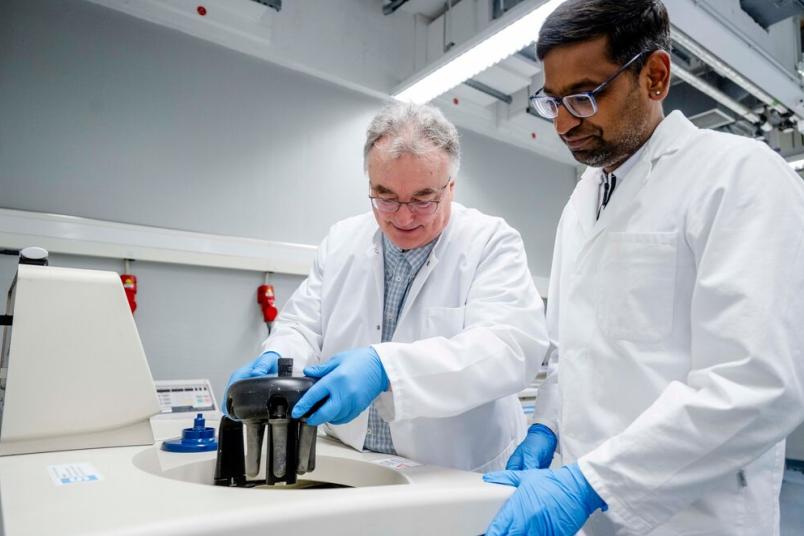
Ralf Erdmann and Vishal Kalel (right) are jointly researching parasites that can cause tropical diseases.
Medicine
Novel point of attack to combat dangerous tropical diseases
Researchers are zeroing in on the Achilles’ heel of pathogens that cause Chagas disease, sleeping sickness and leishmaniasis.
The efforts of a research team from Bochum and Würzburg give hope for new treatment approaches for dangerous tropical diseases. The researchers have compiled a high-precision inventory of the membrane proteins of cell organelles of the African sleeping sickness pathogen. “Some of these proteins contain components that are specific to parasites and differ significantly from those of the host cells,” explains Professor Ralf Erdmann from Ruhr University Bochum, Germany. As a result, they are a good target for potential active substances. The researchers report their findings in the journal Cell Reports from May 27, 2025.
Unique organelles
The researchers studied the pathogen that causes the African sleeping sickness Trypanosoma brucei. Trypanosomes have unique cell organelles, so-called glycosomes, which are essential for the survival of the parasites. “They are considered a potential Achilles’ heel in the development of new drugs,” says Ralf Erdmann.
He and his colleagues Dr. Vishal Kalel and Dr. Chetan Krishna from the Faculty of Medicine at Ruhr University Bochum, in collaboration with Hirak Das of the research group led by Professor Bettina Warscheid at the University of Würzburg, have succeeded in compiling a high-precision inventory of the membrane proteins of these glycosomes. In their study, they have identified the protein components of the glycosome membrane in detail for the first time, including numerous previously unknown components, some of which are parasite-specific.
Promising target for new active substances
Using state-of-the-art subcellular proteomics, 28 glycosome membrane proteins were identified with a high degree of reliability. “Using this technique, we also detected proteins that are associated with glycosome biogenesis, interorganelle communication and protein quality control,” lists Bettina Warscheid. “A particular highlight has been the discovery of TbPEX15, a membrane anchor for an essential protein import complex – a promising target for the development of new drugs, as it differs significantly from its counterpart in humans.”
The findings provide an important basis for the development of new therapies for diseases that affect over 12 million people worldwide, including Chagas disease and leishmaniasis. “In addition, these findings deepen our understanding of parasite biology, open up new avenues for targeted treatment strategies against poorly understood tropical diseases and provide a valuable resource for biomedical research into glycosome biology,” concludes Ralf Erdmann.